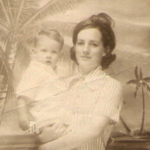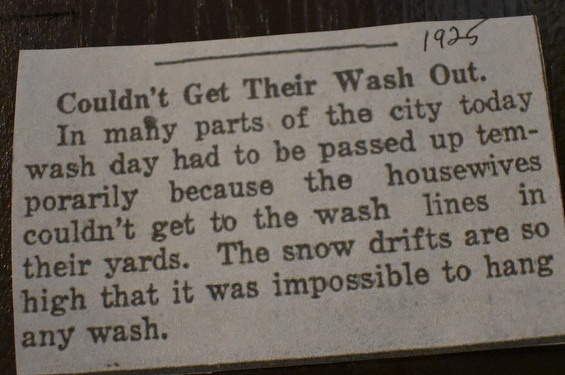
Wash was always done on Monday period. In a very special situation it was "acceptable" to wash on Tuesday.
Clothes washing has been a very interesting study. This history study shows many things.
As I looked back to about 1880 to 1900 there was more work to washing laundry because the soap had to be boiled and the clothing people wore was complicated to wash.
As I move through time I noticed very early after 1900 Fels-naptha started advertising that there would be no more blue Monday because of this soap that would save them time. Then as time was passing I noticed ads stating that women had more time now since their Monday wash day was taken away by the new services that did their wash for them. People paid to send their wash out. Of course this would have been in larger towns. Also people that had larger homes and a larger bank account had their servants to do their wash and those that were not quite as well off had a wash lady to come in on Monday.
Then came along the first washing machines for home use so women wanted their own washing machine because this put them in a higher standing.
Women were very outspoken and each one had their own ideas. One of the post I mentioned early that people criticized quite a bit and often said a critical statement before telling how it should be done. Then something changed women were competing with each other who could get the wash out first. The clothesline was where the gossip of the town started, the women would know by the laundry that hung if someone was sick or a new baby or if someone was late putting out the wash. I see this in the study all through the U.S. and Canada.
Article below is typed out below the article.
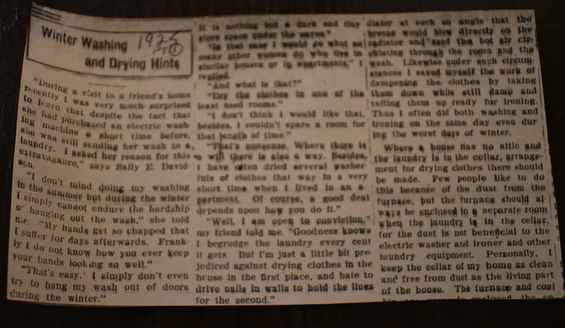
This article reads; 1925
"During a visit to a friend's home recently I was very much surprised to learn that despite the fact that she had purchased an electric washing machine a short time before, she was still sending her wash to a laundry. I asked her reason for this extravagance," says Sally E Davidson.
I don't mind doing my washing in the summer but during the winter I simply cannot endure the hardship of hanging out the wash," she told me. "My hands get so chapped that I suffer for days afterwards. Frankly I do not know how you ever keep your hands looking so well."
"That's easy." I simply don't even try to hang my wash out of doors during the winter."
"Then tell us the secret- What do you do--dry it on the radiators?" she inquired laughingly.
"No, somehow I never could do that I never liked to pile my clothes one on top of the other. Instead I string my clothes lines up in the attic and hang the wash up there," I told her.
"But doesn't it take ages to dry, and does it smell as sweet as when dried out doors?"
"One question at a time, please," I begged. "No it does not take long to dry laundry in the attic. In fact wash dries faster up there than it would if hung outside, and it smells equally as fresh because I not only open the windows a little but also use and electric fan to produce a current of air which blows directly upon the drying laundry."
"I might have known that you would find a way out if there was one, " she laughed, "but that still doesn't help me to solve my problem for I haven't a real attic in my house. It is nothing but a dark and tiny store space under the eaves."
"In that case I would do what so many other women do who live in similar houses or in apartments," I replied.
"And what is that?"
"Dry the clothes in one of the least used rooms."
"I don't think I would like that, besides, I couldn't spare a room for that length of time."
"That's nonsense. Where there is a will there is also a way. Besides, I have often dried several washer-fuls of clothes that way in a very short time when I lived in a apartment. Of course, a good deal depends upon how you do it. "Well, I am open to conviction," my friend told me. "Goodness knows I begrudge the laundry every cent it gets. But I'm Just a little bit prejudiced against drying clothes in the house in the first place and hate to drive nails in walls to hold the lines for the second."
"It seems to me that either one of your objections would be enough," I replied. "but as you say they are really prejudices rather than opinions based on facts. The only redeeming feature is that others share your viewpoint but even that does not make it right."
Frankly, I was just a little bit surprised that anyone would actually condemn something they had never tried, but I proceeded to show my friend how all her objections can easily be overcome by a little thought and ingenuity.
Firstly, I never drove nails into walls and woodwork to hold the clothesline. Under such circumstances I always used long-armed ironing trees or some other contrivances to hold the clothes and dried only such quantity at a time as they would hold. Also when drying clothes in a room I opened a window top and bottom so there would be a steady influx of fresh air. Then I placed a electric fan before the radiator at such an angle that the breeze would blow directly on the radiator and send the hot air circulating through the room and the wash. Likewise under such circumstances I saved myself the work of dampening the clothes by taking them down while still damp and rolling them up ready for ironing. Thus I often did both washing and ironing on the same day even during the worst days of winter.
Where a house has no attic and the laundry is in the cellar, arrangement for drying clothes there should be made. Few people like to do this because of the dust from the furnace should always be enclosed in a separate room when the laundry is in the cellar for the dust is not beneficial to the electric washer and ironer and other laundry equipment. Personally, I keep the cellar of my home as clean and free from dust as the living part of the house. The furnace and coal bin are properly enclosed, the entire cellar is white-washed once or twice a year, and the electric cleaner keeps the floor free from the accumulation of dust. Further to facilitate cleanliness in the cellar we had the ceiling plastered and white washed, which was not an expensive process, and, besides aiding in keeping the cellar clean, it also prevents the coal dust and ashes from seeping through the floor to the upper part of the house.
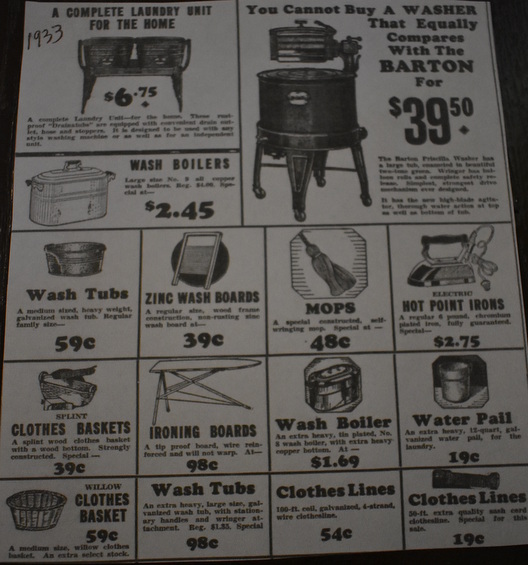
There were many ways to wash and iron the laundry but it was many years later for a clothes dryer that was a after mid century for most households.
As we move through time we pass the Victorian era where servants did the wash then into the 20's we have a Monday wash lady as those less fortunate continued to wash laundry without anything modern. Then women started sending out the wash as heavily advertised the wonderful service available to them. The upper class society seems to become very disturbed with the location that the washed is hung and the way it is hung. This went on for quite a few years.
Don't let this article below fool you to think there was a dryer to dry clothes at this time because there was no such thing, however, clothing styles were changing and there were many different opinions about how to dry the laundry. The Victorian era drab colors were no longer and clothing and household items were more colorful now.
So a few got together to come up with a plan to improve the situation.
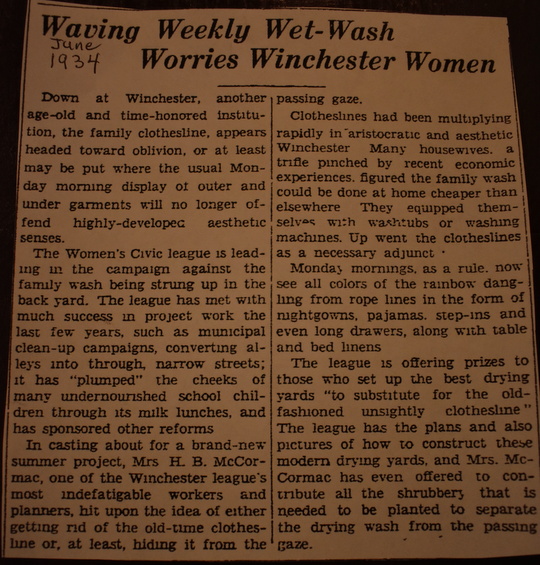
One thing I forgot to mention about doing the wash is women had wash dresses to wear for quite a long time.
The article below will be typed out to read below the article.
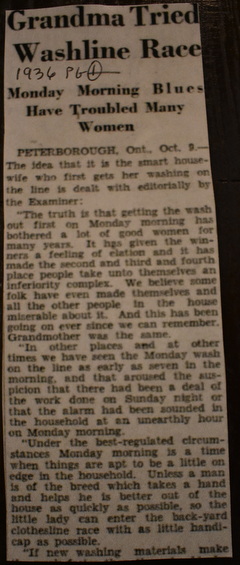
The article above reads,
1936
The idea that it is a the smart housewife who first gets her washing on the line is dealt with editorially by the Examiner;
"The truth is that getting the wash out first on Monday morning has bothered a lot of good women for many years. It has given the winners a feeling of elation and it has made the second and third and fourth place people take unto themselves an inferiority complex. We believe some folk have even made themselves an all the other people in the house miserable about it. And this has been going on ever since we can remember.
Grandmother was the same.
"In other places and at other times we have seen the Monday was on the line as early as seven in the morning, and that aroused the suspicion that there had been a deal of the work done on Sunday night or that the alarm had been sounded in the household at an unearthly hour on Monday morning.
"Under the best-regulated circumstances Monday morning is a time when things are apt to be a little on edge in the household. Unless a man is of the breed which takes a hand and helps he is better out of the house as quickly as possible, so the little lady can enter the back-yard clothesline race with as little handicap as possible.
"If new washing materials make the work faster then they should also make the work easier; it should be possible to attain the same results with less speed. We do not believe anything can be done about it. Women have been at it for long years, and the time at which the clothes appear on the line has been regarded as somewhat of a yard stick by which competence could accurately be judged."
"Bride Broder" in the Mail and Empire takes issue with this. For her part she doesn't "care a thrawneen" whether the washing goes out early or not. She says:
"We have done quite a lot of washing one way or another in our varied life, but we did it exactly when we jolly well pleased, or when the necessity arose, or the air seemed the sort that would scent the clothes deliciously, or there was plenty of hot water, or any number of things. But we were never in the least interested in a clothesline marathon and we'd like to wager that in this sublime indifference we're not in the least unique."
But on Ontario farms fairly close the eagle eye can see a long way and on Mondays snowy-white laundry is conspicuous. Interviewed on the subject a girl in domestic employ says her mother judges character of the housewife entirely by the time she gets her washing done. Or she scents something extraordinary.
"Near 12 o'clock and Jenny's line is not out yet!" Her tone says volumes. Or she might say: "I guess Mrs. Peast will be tired today and won't come over; her line was out much earlier than usual and she had a bigger wash than most days: perhaps she had folks staying over the week-end.
"They ought to invent some kind of washable paper sheets that would still look good and save the laundry.
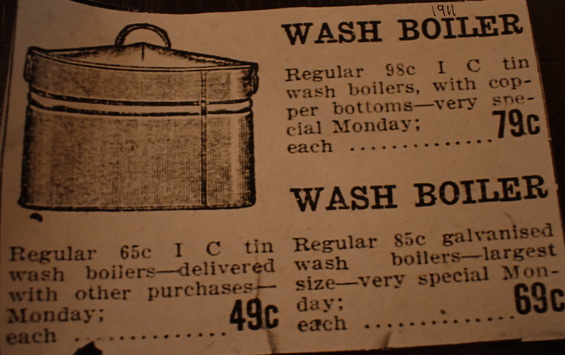
If you ever see one of these in a antique store you will now know if you didn't already that this is a wash Boiler.
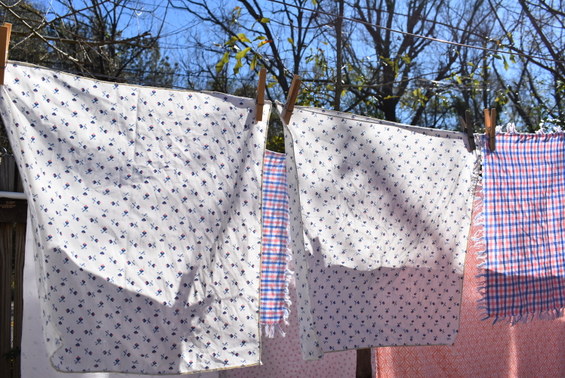
I am going to tell you, I would be in big trouble if I did live back then because I would be shunned at what day or time I get my wash out. Grandma Donna
